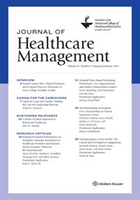
JOURNAL OF HEALTHCARE MANAGEMENT
Scope & Guideline
Navigating the Future of Healthcare Management.
Introduction
Aims and Scopes
- Healthcare System Performance:
The journal emphasizes the measurement and improvement of healthcare system performance, exploring factors that influence operational efficiency, financial viability, and patient care quality. - Leadership and Organizational Culture:
A core area of focus is the role of leadership in shaping organizational culture and effectiveness, particularly how leadership practices can enhance employee engagement and patient safety. - Technology Integration in Healthcare:
The journal addresses the integration of technology in healthcare, including the use of AI, electronic health records, and telemedicine, to improve care delivery and operational efficiency. - Patient Experience and Engagement:
Research on patient experience and engagement is critical, highlighting strategies for enhancing patient satisfaction and outcomes through effective communication and care delivery models. - Health Equity and Access:
The journal also focuses on health equity, examining disparities in healthcare access and outcomes, and advocating for policies that promote equitable healthcare delivery.
Trending and Emerging
- Digital Transformation in Healthcare:
A significant trend is the exploration of digital transformation, including the use of AI, machine learning, and telehealth to enhance patient care and operational efficiency. This reflects the ongoing need for healthcare systems to innovate in a rapidly changing technological landscape. - Workforce Well-being and Burnout Prevention:
There is an increasing emphasis on workforce well-being, with research focusing on burnout prevention strategies for healthcare professionals. This theme is critical as healthcare organizations strive to maintain a resilient workforce amid ongoing challenges. - Patient Safety Initiatives:
Emerging research highlights innovative patient safety initiatives, including executive rounding and safety culture assessments, which are crucial for improving healthcare quality and reducing adverse events. - Value-Based Care Models:
The journal is seeing a rise in studies related to value-based care models, emphasizing the importance of aligning healthcare delivery with patient outcomes and satisfaction rather than volume of services. - Equity in Healthcare Access:
Growing attention is being paid to equity in healthcare access, with publications focusing on strategies to reduce disparities and improve care for underserved populations, reflecting a broader societal commitment to health equity.
Declining or Waning
- Traditional Cost Management Strategies:
There is a noticeable decline in publications focused solely on traditional cost management strategies. As healthcare shifts towards value-based care, the emphasis has moved towards quality improvement and patient outcomes rather than just cost reduction. - Crisis Management Approaches:
Themes related to crisis management, particularly those focused on reactive strategies, have waned. The journal's recent publications reflect a shift towards proactive leadership and resilience-building in healthcare organizations. - Clinical Roles of Healthcare Providers:
Research specifically centered on the clinical roles of healthcare providers, such as physician responsibilities, has decreased. This shift suggests a growing interest in broader organizational and systemic issues over individual clinical practice. - Basic Operational Metrics:
There is a reduced focus on basic operational metrics without contextual analysis. The journal now favors comprehensive studies that link operational performance to strategic outcomes and patient care.
Similar Journals
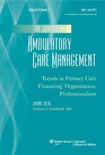
JOURNAL OF AMBULATORY CARE MANAGEMENT
Elevating standards in ambulatory care management and policy.JOURNAL OF AMBULATORY CARE MANAGEMENT, published by Lippincott Williams & Wilkins, is a leading peer-reviewed journal dedicated to advancing research and practice in the field of health policy, with a specific focus on ambulatory care management. Since its inception in 1978, this journal has served as a critical platform for disseminating innovative studies, insights, and methodologies that inform policy makers, healthcare professionals, and academic researchers alike. By maintaining an impressive ranking within the Q3 category in Health Policy and a Scopus rank of 148 out of 310, it underscores the journal's growing influence in shaping health policy discussions and decisions. The journal operates on a traditional subscription model, ensuring a high-quality review process while remaining accessible to those wishing to subscribe. With an ongoing commitment to excellence, the JOURNAL OF AMBULATORY CARE MANAGEMENT is essential for anyone involved in improving outcomes in ambulatory care settings and influencing health policy reforms, making it a must-read for researchers, practitioners, and students aiming to stay at the forefront of healthcare innovation.
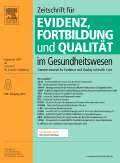
Zeitschrift fur Evidenz Fortbildung und Qualitaet im Gesundheitswesen
Shaping health outcomes with impactful evidence and education.Zeitschrift für Evidenz Fortbildung und Qualität im Gesundheitswesen, published by Elsevier GmbH, serves as a pivotal platform for the dissemination of research and innovations within the realms of health policy, medicine, and education. Established in 2008 and continuing its impactful trajectory through 2024, this journal boasts a recognition as a Q2 journal in Education and positions itself within the Q3 tier for both Health Policy and miscellaneous Medicine categories, reflecting its dual focus on scholarly rigor and practical application. Despite not being an Open Access journal, it remains a valued resource for academics and practitioners, evidenced by its rankings: #214 out of 398 in Medicine (miscellaneous) and #829 out of 1543 in Social Sciences (Education) according to Scopus metrics. The journal's commitment to enhancing education and quality in healthcare makes it an essential read for researchers, professionals, and students seeking to stay abreast of the latest evidence-based practices and policies that shape health outcomes worldwide.
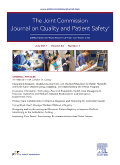
Joint Commission Journal on Quality and Patient Safety
Empowering healthcare professionals with essential knowledge.The Joint Commission Journal on Quality and Patient Safety is a leading publication in the field of health care quality and patient safety, under the esteemed auspices of Academic Press Inc Elsevier Science. With an impact factor reflecting its rigorous peer-review process and scholarly reputation, this journal aims to disseminate cutting-edge research, innovative practices, and effective strategies that enhance patient safety and healthcare delivery, making it an essential resource for researchers, professionals, and students alike. Operating without Open Access, the journal stands out with its impressive rankings in various Scopus categories, notably #4 in Nursing & Pediatrics and #10 in Nursing Leadership & Management, evidencing its significant impact in these fields. Since its inception in 2005, the journal has become a cornerstone for advancing knowledge and improving practices in healthcare settings, continuing to contribute to the dialogue on patient outcomes and quality improvement through 2024 and beyond. For practitioners and scholars dedicated to the advancement of healthcare standards, the Joint Commission Journal on Quality and Patient Safety remains a vital source of information and inspiration.
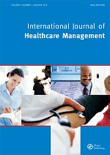
International Journal of Healthcare Management
Connecting scholars and practitioners in healthcare management.The International Journal of Healthcare Management, published by ROUTLEDGE JOURNALS, TAYLOR & FRANCIS LTD, stands as a crucial platform for the dissemination of innovative research and insights in the realm of healthcare management. With a focus on health policy, leadership, and management, this journal aims to bridge the gap between theory and practice, providing a valuable resource for researchers, professionals, and students alike. It boasts an impressive Q2 ranking in Leadership and Management and a Q3 ranking in Health Policy for 2023, highlighting its influence and relevance within the academic community. With an accessible ISSN of 2047-9700 and E-ISSN of 2047-9719, the journal features an array of peer-reviewed articles that promote the advancement of knowledge and best practices in healthcare settings. While currently not offered as open access, the journal publishes high-quality research that underscores the importance of effective management strategies in enhancing healthcare outcomes. Positioned in the United Kingdom, the journal continues to contribute significant knowledge and frameworks that guide healthcare leaders and policymakers in navigating the complexities of governance in health services.
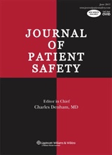
Journal of Patient Safety
Connecting Knowledge and Practice for Patient Safety ExcellenceThe Journal of Patient Safety, published by Lippincott Williams & Wilkins, is a premier scholarly journal dedicated to advancing the field of patient safety through empirical research, innovative practices, and critical insights. Established in 2006, this journal has rapidly gained recognition, currently holding a prestigious Q1 ranking in Leadership and Management and a Q2 ranking in Public Health, Environmental and Occupational Health for 2023, reflecting its significant impact within these disciplines. With an impressive rank of #7 in Nursing Leadership and Management and #211 in Medicine Public Health as recorded in Scopus, this journal serves as an essential resource for researchers, healthcare professionals, and students committed to improving patient safety and outcomes. The journal does not operate as an open access publication; however, its comprehensive scope and high-quality articles underscore its dedication to disseminating crucial knowledge in a field that is ever-evolving. Joining the readership of the Journal of Patient Safety means becoming part of a vital conversation aimed at redefining standards of care and enhancing safety protocols across various healthcare settings.

Asia Pacific Journal of Health Management
Fostering Excellence in Health Management ResearchAsia Pacific Journal of Health Management is a distinguished open-access journal published by the Australian College of Health Service Management. Since its inception in 2006, this journal has become an essential resource for researchers, practitioners, and students in the fields of health policy, public health, and health information management. With a commitment to disseminating high-quality research, it operates from Australia, serving as a platform for innovative studies and discussions that address contemporary issues in health management across the Asia-Pacific region. The journal is indexed in Scopus, holding a rank of #228 in Health Policy and #499 in Public Health, indicative of its growing impact, although classified in the Q4 quartile for several categories in 2023. This positions the journal as a valuable resource for understanding health challenges and management practices, promoting a comprehensive understanding of health systems within diverse contexts. Whether you are a seasoned researcher or an emerging scholar, the Asia Pacific Journal of Health Management offers a vital outlet for sharing insights that advance the discipline and improve health outcomes.

Journal of Patient Experience
Connecting research with real-world patient needs.Journal of Patient Experience, published by SAGE Publications Inc, serves as a vital resource in the realms of Health Policy, Health (Social Science), and Leadership and Management. This open-access journal, established in 2014, is dedicated to enhancing the understanding of patient experiences and its implications on healthcare delivery and outcomes. With an impressive impact factor indicative of its scholarly significance and a current category quartile ranking of Q2 across multiple disciplines, it plays a crucial role in disseminating innovative research that informs policy and practice. The journal is indexed in Scopus, further affirming its contributions within the social sciences and healthcare sectors. It aims to foster interdisciplinary collaboration among researchers, healthcare professionals, and students, driving the conversation toward meaningful improvements in patient care. Its continued commitment to excellence makes it an essential read for anyone invested in the future of healthcare.
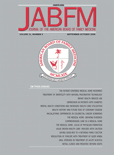
Journal of the American Board of Family Medicine
Bridging Gaps in Family Practice and Public Health.The Journal of the American Board of Family Medicine, with ISSN 1557-2625 and E-ISSN 1558-7118, is a prestigious publication dedicated to advancing the field of family medicine. Published by the American Board of Family Medicine, this journal has established itself as a vital resource for researchers, practitioners, and students interested in both family practice and public health. As of 2023, it boasts impressive rankings, being in the Q1 category of Family Practice and the Q2 category of Public Health, Environmental and Occupational Health according to Scopus metrics, reflecting its significant impact and influence in the academic community. The journal's focus on high-quality research ensures that it remains at the forefront of evidence-based practice, fostering the dissemination of knowledge that is critical for improving patient care and outcomes. This journal, although not open-access, provides a wealth of insights and findings relevant to professionals striving to enhance their understanding and implementation of best practices in family medicine. With a converged publication history starting in 2002, it continues to serve as an essential platform for innovative studies and discussions that shape the future of family medicine.

AMERICAN JOURNAL OF MANAGED CARE
Transforming healthcare insights into impactful policies.AMERICAN JOURNAL OF MANAGED CARE is a premier peer-reviewed journal dedicated to the dissemination of research and insights in the fields of health policy and managed care. Published by Managed Care & Healthcare Communications LLC, this esteemed journal has been instrumental in shaping discussions on healthcare management and policy since its inception in 1996. With a 2023 classification in the first quartile (Q1) for both Health Policy and Medicine (miscellaneous), it stands as a significant resource for researchers, professionals, and students seeking to stay at the forefront of healthcare advancements. While this journal does not offer open access, it provides essential content that influences policy formulation and clinical practices across the United States and beyond. With a robust impact factor and a strategic focus on evidence-based methodologies, the AMERICAN JOURNAL OF MANAGED CARE remains committed to fostering a deeper understanding of managed care systems and improving healthcare delivery.
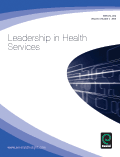
Leadership in Health Services
Navigating the complexities of healthcare leadership.Leadership in Health Services, published by Emerald Group Publishing Ltd, is a premier academic journal dedicated to exploring the nuances of leadership within the healthcare sector. Since its inception in 2007 and continuing through 2024, this journal aims to disseminate high-quality research that contributes to the understanding and development of effective leadership strategies in health services management. With an impressive Q2 ranking in Business, Management and Accounting and a rank of #154 in the Health Policy category of Scopus, this journal is a respected resource for researchers, professionals, and students alike, looking to impact the evolving landscape of healthcare leadership. Although it does not offer an open-access format, articles published in the journal are rigorously peer-reviewed, ensuring that readers receive only the most insightful and relevant findings. Located in the United Kingdom, Leadership in Health Services is committed to fostering discussions that address critical issues and engage a diverse audience interested in driving improvement in health service delivery and policy.